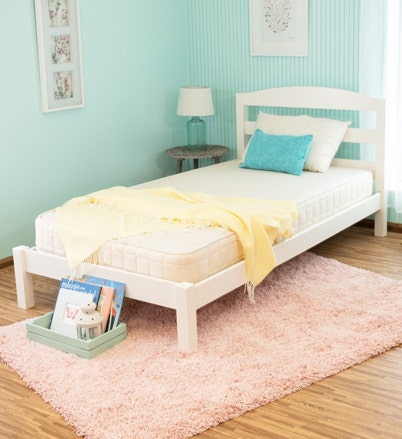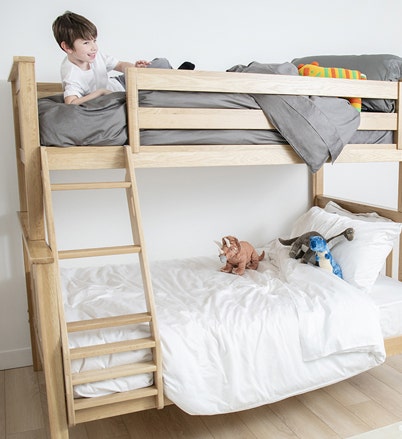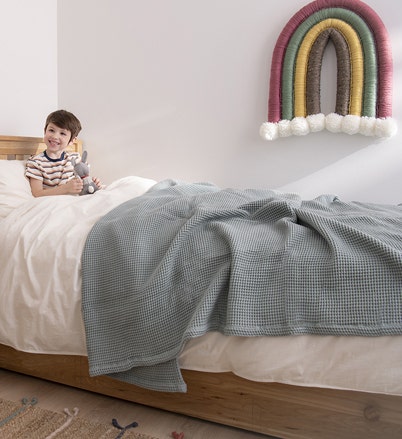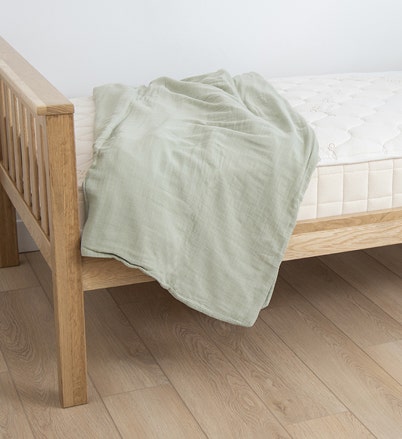When it comes to daytime potty training versus nighttime potty training, the progress made can feel like night and day.
Just because your little one has mastered daytime potty training doesn’t mean they are at the same level with nighttime. It’s a whole new challenge for them to conquer – and for you! For your sanity, it’s best to treat nighttime potty training like its own separate milestone, and we’re happy to walk you through it. With a lot of patience and a few helpful strategies, drier nights can be a reality and not just a distant dream.
Here’s our guide to nighttime potty training!
Why Is Nighttime Potty Training So Hard?


Feeling afraid of the dark? Nighttime can feel scary for various reasons and not just because it makes potty training that much harder.
Nighttime potty training involves elements that daytime potty training doesn’t need to consider, like:
- Physiological development
- Sleep patterns
- Psychological factors
- Practical consideration
Each child's readiness varies, and patience, consistency and understanding are crucial in navigating this stage of development.
3 Unique Challenges of Nighttime Potty Training
Unlike daytime training, which focuses on regular bathroom trips and gradual understanding of bodily signals, nighttime training involves deeper physiological and developmental aspects that are often beyond immediate control.
Physiological Readiness
Firstly, nighttime training hinges on a child's ability to recognize and respond to bodily cues while asleep. This requires a level of physiological readiness, including the development of the hormone vasopressin, which reduces urine production at night. Until this hormone production matures, many children simply produce more urine than their bladders can hold overnight, making accidents common.
Individual Psychology
Nighttime potty training is also influenced by individual variations in deep sleep patterns. Children may not wake up when their bladders are full, leading to accidents even if they are capable of staying dry during the day. The ability to wake up in response to a full bladder develops with age and varies widely among children. The psychological aspect of nighttime training adds complexity. Children may feel discouraged or frustrated by nighttime accidents, affecting their motivation and confidence. Parents, too, may experience stress and fatigue from interrupted sleep and the continuous need for overnight supervision.
Practical Considerations
Lastly, unlike daytime accidents that are often easily cleaned up, nighttime accidents involve changing bedding and disrupting sleep, which can be exhausting for both parents and children. (Luckily, we have a solution for that! Our 2-in-1 Organic Kids Mattress is a great bed for toddlers that makes clean up easy – keep reading to learn more.)
When Do Kids Master Nighttime Dryness?
Most children achieve nighttime potty training between the ages of four and five, though individual timelines can vary widely. Most children naturally cease bedwetting by age five, with around 85%, and by age seven, approximately 90% no longer experience it. When bedwetting persists beyond age five or six, it may be a sign of a sleep disorder known as nocturnal enuresis.
Nighttime potty training is a developmental milestone that depends on the child's physical readiness, such as the ability to produce less urine at night, and their neurological development, which allows them to wake up when they need to use the bathroom. Parents can support this process by encouraging daytime toilet independence first and ensuring a consistent bedtime routine that includes bathroom breaks. Patience and encouragement are key as children navigate this important step towards full independence in their personal care routines.
11 Tips for Cleaner, Drier Nights
Once you and your little one have mastered daytime dryness, it’s time to refocus your energy on nighttime. Remember, every child is different, so it may take time for them to master this developmental skill. Here are our top tips for cleaner, drier nights and sweeter dreams for all:


- Wait until your child consistently wakes up dry from naps or overnight.
- Establish a bedtime routine that includes a final bathroom trip.
- Limit fluids in the evening, especially sugary drinks, close to bedtime.
- Use waterproof mattress protectors to minimize cleanup, like this organic one!
- Consider using disposable or washable training pants for added protection.
- Keep a nightlight or pathway to the bathroom for easy access.
- Place a portable potty nearby for easy access in the middle of the night.
- Talk to your little one about nighttime potty training, offering reassurance and understanding.
- Offer positive reinforcement such as stickers or small rewards for dry nights.
- Stay patient and avoid punishment for accidents; accidents are part of the learning process.
- Encourage independence by letting your child take charge of their nighttime routine as much as possible.
Bonus Tip! Get a Waterproof Organic Mattress!


Waterproof mattress protectors are a potty-training must, but if you’re looking to minimize moisture and messes even further, investing in a waterproof organic mattress is logical next step. The 2-in-1 Organic Kids Mattress from Naturepedic features a convenient waterproof side for your potty training stages and then easily flips to a quilted side for comfort that lasts. Its waterproof layer is made from non-GMO sugarcane and contains absolutely no glues, adhesives, chemical flame retardants or polyurethane foam. It’s the perfect first big kid bed addition!
When Is Bedwetting a Concern?
Bedwetting is common in young children up to around age five, but persistent issues may indicate an underlying cause. Changes at home, like a new baby or family stress, can also contribute to temporary setbacks. It's important to consult your pediatrician if you're concerned about health or behavioral issues. For older children beyond age five or six who continue to wet the bed despite being potty trained during the day, additional support may be needed. Sometimes, children aren't developmentally ready for nighttime potty training, which is normal. However, ongoing bedwetting could signal other issues such as:
- Delayed communication between brain and bladder
- Illness or constipation
- Emotional stress or trauma
- Medical conditions
Temporary concerns like illness often resolve with time, while others may require professional intervention.
As your little one sleeps soundly, remember this: nighttime potty training is a journey of patience, love and lots of midnight trips to the bathroom. Celebrate every dry night and every small victory, for each one brings you closer to those mornings filled with giggles and dry pajamas. So, here's to the adventure ahead, one sleepy step at a time!
You can learn more about bedwetting and when to be concerned here.
 BABY
BABY  KIDS
KIDS  ADULT
ADULT  LEARN
LEARN  STORES
STORES 





